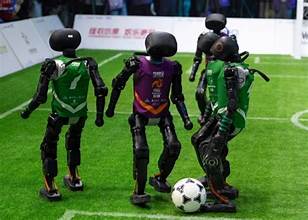Faceplants and Futurism: China’s Humanoid Robots Compete in Slapstick Soccer Tournament
BEIJING — On a soccer field outside Beijing, three-on-three matches took place that looked less like elite athletics and more like a blooper reel: robots waddled, stumbled, and tumbled in slow-motion collisions as the crowd cheered on.
This was no joke — it was a serious test for China’s humanoid robotics industry.
Equipped with advanced sensors and autonomous AI systems, the child-sized humanoid robots face-planted and occasionally hogged the ball, but also navigated the field without human control. While some had to be carried off on stretchers, others scored with surprising precision. In the final, Tsinghua University’s THU Robotics beat China Agricultural University’s Mountain Sea team 5–3.
⚙️ AI Tech Behind the Bloopers
Despite the spectacle, each robot was fully autonomous, relying on integrated vision, navigation, and decision-making systems. There were no human operators controlling the action — making this a real-world stress test of embodied AI.
“The field is the lab,” said Cheng Hao, CEO of Booster Robotics, which supplied the players. “Every stumble improves the code. Every goal advances the tech.”
🧠 Why It Matters: China’s Robotics Surge
Behind the slapstick lies serious investment. According to Morgan Stanley:
🇨🇳 China’s robotics market is expected to reach $108 billion by 2028
🤖 By 2050, China could have 302 million humanoid robots in use
🇺🇸 U.S. projection: 77.7 million robots in same timeframe
Morgan Stanley’s Sheng Zhong says China’s lead in embodied AI “may widen further before the U.S. fully responds.”
🏟️ 2025 World Humanoid Robot Games Incoming
Saturday’s soccer match served as a preview of the World Humanoid Robot Games, which China will host from August 15–17, 2025 in Beijing.
The games will feature 11 robot sports, including:
Track & field
Gymnastics
Soccer
And possibly, human-robot mixed events
🧩 Safety Still a Hurdle
Booster Robotics CEO Cheng Hao noted that human-robot matches are a future goal, but only if safety can be guaranteed.
“A robot and a human could play a match where winning doesn’t matter,” he said. “But real interaction must feel safe — that builds trust.”
⚽ For Now, China’s Robots Are Winning Hearts
With China’s national men’s soccer team sitting at 94th in FIFA rankings, the humanoids might be giving fans something to cheer for. At least they’re scoring goals — and drawing smiles.


